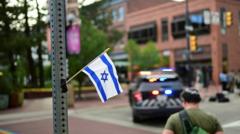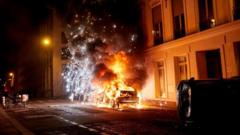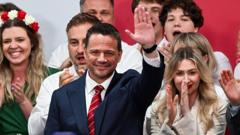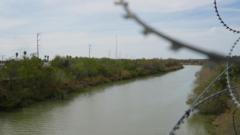In a bid to tackle soaring gang violence, President Daniel Noboa has requested military aid from the United States, European nations, and Brazil. He aims to bolster Ecuador's defenses against powerful drug trafficking networks and is advocating for the designation of local gangs as terrorist organizations, a move intended to gain foreign support and resources.
Ecuador's President Calls for International Military Support to Combat Gang Violence
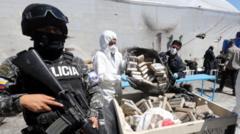
Ecuador's President Calls for International Military Support to Combat Gang Violence
Amid escalating violence and significant drug trafficking challenges, Ecuador's President Daniel Noboa seeks military assistance from the US, Europe, and Brazil, proposing a tough stance against criminal gangs.
Ecuador's President Daniel Noboa has made headlines by calling upon the armies of the United States, European nations, and Brazil to join his "war" against rampant gang violence in the country. In an interview with the BBC, Noboa expressed that half of the world's cocaine trafficking runs through Ecuador’s ports, underscoring the urgent need for international military assistance to combat the growing threat posed by criminal gangs, referred to as "international narco-terrorist" groups.
Noboa is looking for the US to designate Ecuadorean gangs, such as Los Lobos and Los Tiguerones, as terrorist organizations—similar to the designations previously granted to some Mexican and Venezuelan cartels by Donald Trump. He argues that such designations would enhance US law enforcement's ability to combat these criminal networks. Noboa stated, "We need to have more soldiers to fight this war" and has called for cooperation agreements with allied nations to reinforce Ecuador's police and military.
Despite previously indicating an interest in foreign military aid, this marks the first instance where Noboa has specifically singled out the involvement of the US and its allies. As he gears up for a tight run-off election on April 13, 2025, addressing issues of security has become paramount, especially after a year where the murder rate declined by 16% yet remained alarmingly higher than before his presidency.
With rising violence—including a record 781 killings in January alone—Noboa’s administration has come under scrutiny for his heavy-handed tactics against gangs. While supporters argue this approach is necessary, critics contend that it leads to civil rights violations and risks military overreach, particularly regarding Noboa's collaboration with Erik Prince, founder of the controversial private military company Blackwater. Noboa maintains that any military support must adhere to Ecuadorian laws.
In addition to seeking military assistance, Noboa is pursuing constitutional changes that would allow foreign military bases back into Ecuador, a policy suspended since 2009. He faces the challenge of convincing international leaders of the mutual benefits of joining Ecuador's fight against drug trafficking—a situation worsened by the detrimental economic impact of violence on the country's GDP.
As unemployment and violence rise, many Ecuadoreans are fleeing the country, exacerbating the situation further. Noboa argues for the urgent need to create job opportunities to retain the populace, suggesting that an export-based economy could incentivize people to stay.
With the upcoming elections looming, Noboa contends that the fight against transnational crime requires unified international action, advocating for a strong policy response not just from Ecuador, but globally, where consumption drives drug violence and production in nations like his.
The efficacy of Noboa’s stringent policies, particularly in rallying international support, will likely be closely scrutinized as Ecuador grapples with the dual challenges of gang violence and organizing a sustainable economy that provides for its citizens' needs.




